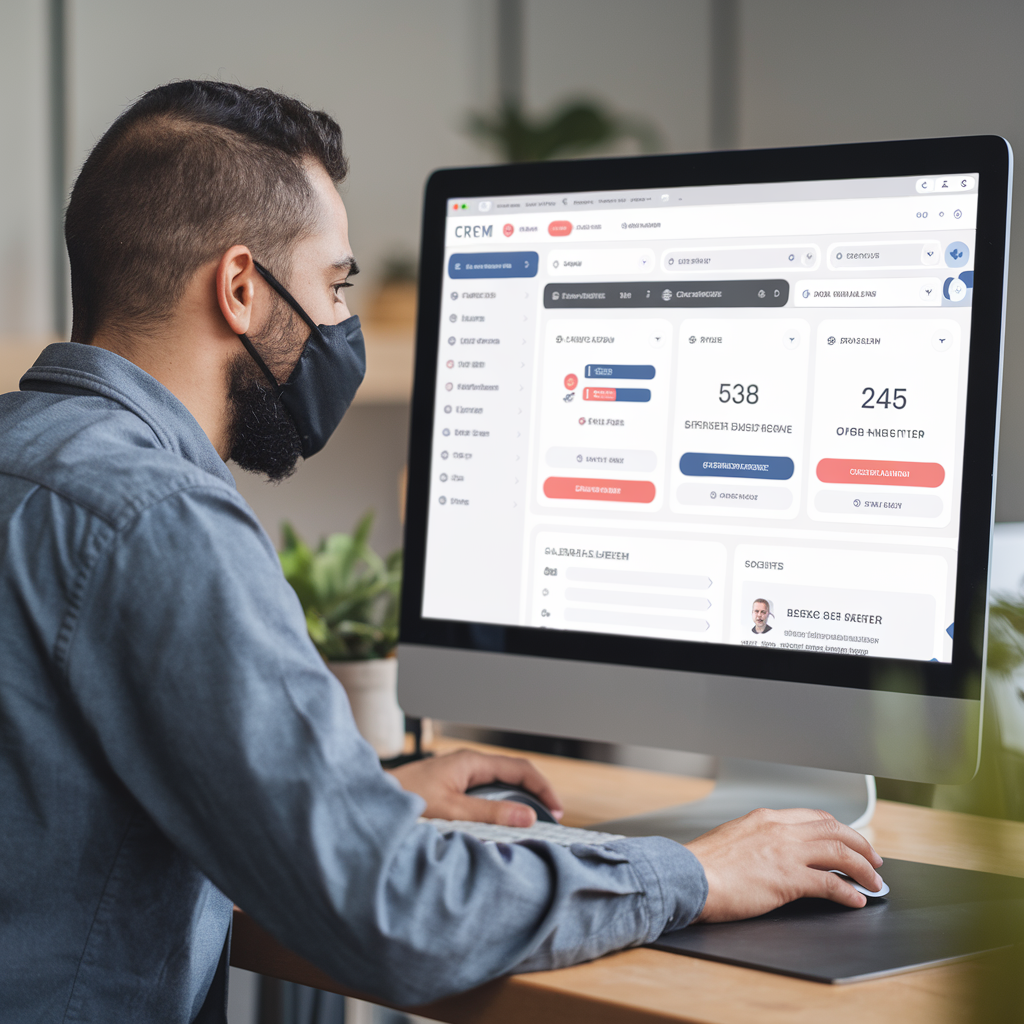TL;DR:
- Key CRM Features: Intuitive dashboards, custom workflows, integration capabilities, lead tracking, automation.
- Choosing a CRM: Identify specific features needed; consider budget, deployment type, integration, and required features.
- Integration Importance: Seamless integration reduces errors and boosts productivity; necessary for small business growth.
- Scalability: Allows the CRM to adapt as the business evolves; supports increased users and data.
- CRM Pricing: Prices vary; review upfront fees, subscription models, and seek transparent pricing.
- Customer Support: Essential for user adoption; look for live chat, phone support, online resources, dedicated account managers.
- Common Pitfalls: Avoid complexity, lack of essential features, and poor user adoption to maximize CRM effectiveness.
Is your business stumbling over spreadsheets and sticky notes to track customers? You’re not alone. Many businesses struggle without the right tools. But there’s a game-changer: a top-notch CRM.
This guide highlights key CRM features that streamline operations, boost customer engagement, and drive growth.
Essential CRM Features to Look for in a CRM
CRM systems are vital for managing customer relationships. They support sales, marketing, and customer service. These platforms streamline operations by tracking leads, monitoring relationships, and keeping organized contact lists. CRMs help businesses maintain a clear overview of customer interactions, enhancing relationship management.
Key features to seek in a CRM include:
- Intuitive dashboards
- Custom workflows
- Integration capabilities
- Lead tracking
- Automation
These features are essential, not just added benefits. Intuitive dashboards offer a user-friendly interface for easy navigation and data analysis. Custom workflows allow for tailoring processes to specific business needs, boosting efficiency. Integration capabilities let the CRM connect with existing software, enhancing functionality. Lead tracking is crucial for managing prospects and turning them into customers. Automation reduces manual tasks, freeing time for strategic activities.
These features improve customer interactions by equipping teams with the right tools for effective and efficient engagement. Enhanced engagement boosts customer satisfaction and loyalty, driving business growth.
Choosing the Right CRM Software for Your Business

Choosing the right CRM starts with understanding your business needs. Ask, “What specific features do we require?” Focus on essentials like lead tracking, task automation, and email marketing. These features suit various business goals and team sizes. Consider your team size and CRM objectives. Whether improving customer engagement as a small team or streamlining operations as a larger organization, tailor your CRM to your unique needs.
When evaluating CRM options, keep these four criteria in mind:
- Budget: Consider both initial and ongoing costs.
- Deployment Type: Choose between cloud-based or on-premise solutions based on your needs.
- Integration: Ensure the CRM connects easily with existing tools.
- Feature Requirements: Identify must-have features aligning with your business processes.
Evaluating these aspects ensures a successful CRM implementation. Aligning your choice with business needs means the CRM enhances rather than complicates operations. A well-chosen CRM supports current goals and adapts as your business grows, leading to better efficiency and customer engagement.
CRM Integration and Scalability: What Small Businesses Should Know
Integration is crucial when selecting a CRM for small businesses. Why is it important? Integration allows the CRM to work seamlessly with existing tools like email systems and marketing platforms. It ensures data flows smoothly across platforms, reducing manual data entry and minimizing errors. A well-integrated CRM boosts productivity by streamlining operations and providing a unified view of customer interactions.
| CRM Name | Integration Features | Scalability |
|---|---|---|
| CRM A | Connects with 500+ apps, API available | Supports up to 1,000 users |
| CRM B | Integrates with email and social media platforms | Scalable for unlimited users |
| CRM C | Offers custom integrations, partners with major software providers | Expandable database and user capacity |
Scalability is also key for businesses planning to grow. How does it benefit small businesses? A scalable CRM can grow with your business, accommodating more users, data, and features without requiring a complete system overhaul. This flexibility means your CRM adapts as your business evolves, ensuring continuity and efficiency. Selecting a CRM with robust integration and scalability ensures your system supports your business now and in the future.
CRM Pricing and Cost-Effectiveness for Small Businesses
CRM pricing varies widely. How should you navigate this? Understand your budget and potential costs. Prices can range significantly based on features, deployment type, and business size. Some CRMs offer basic plans at lower costs; others charge a premium for advanced features. Transparent pricing is crucial to avoid unexpected expenses and plan finances accurately.
Here are three tips for evaluating CRM costs:
- Review upfront fees: Consider initial setup and training costs.
- Analyze subscription models: Compare monthly vs. annual plans and their inclusions.
- Ensure transparency: Select CRMs with clear pricing to prevent hidden charges.
Determining cost-effectiveness involves more than just the price tag. Consider long-term value. Does the CRM improve efficiency or enhance customer satisfaction? A cost-effective CRM should align with business objectives and enhance operations affordably. Evaluate its return on investment by how well it supports your goals and scales with growth.
Importance of Customer Support in CRM Systems

Why is customer support crucial in CRMs? It ensures efficiency by helping users fully utilize the software. Robust support can make or break adoption as it aids users in navigating features and resolving issues. Excellent support services reduce downtime, boost productivity, and increase user confidence, driving customer satisfaction.
Look for these support options in a CRM:
- Live chat
- Phone support
- Online resources
- Dedicated account managers
How do these options enhance CRM usage? They provide multiple assistance channels, ensuring help is available when and where needed. Live chat and phone support offer immediate answers, reducing wait times. Comprehensive online resources empower users to troubleshoot independently. Dedicated account managers provide personalized assistance, understanding your needs and offering tailored guidance. These support features ensure a seamless CRM experience, allowing teams to focus on building strong customer relationships.
Potential Pitfalls When Selecting a CRM
Choosing the right CRM is crucial but often accompanied by common traps. Why care about these errors? They can waste resources and hinder user adoption, affecting the CRM’s effectiveness. Awareness helps in making informed decisions aligning the CRM with business needs.
Common pitfalls include:
- Complexity: Overly complicated CRMs overwhelm users, reducing efficiency.
- Lack of features: Missing essentials can limit the CRM’s usefulness.
- Poor user adoption: Unfriendly systems may cause resistance, impacting productivity.
To avoid these issues, focus on simplicity and essential functionality. Select a CRM with features you truly need, avoiding unnecessary complexity. Encourage user adoption with an intuitive interface and comprehensive training. This approach ensures CRM implementation supports business goals, driving growth and efficiency.
Final Words
Nailing down what to look for in a CRM isn’t just about ticking boxes. It’s about ensuring that the chosen system aligns with business goals and operations.
Key CRM features—like intuitive dashboards, custom workflows, and seamless integrations—are central to boosting efficiency and enhancing customer interactions. Evaluating cost-effectiveness and robust customer support further rounds out a wise choice.
By steering clear of common pitfalls and focusing on what truly matters, businesses can select a CRM that not only meets immediate needs but also grows alongside them, paving the way for sustained success.
FAQs
What are the primary goals of a CRM?
The main goals of a CRM are to manage customer interactions, improve communication, enhance sales, and maintain relationships to boost customer satisfaction and business growth.
What essential features should a CRM have?
Key features include intuitive dashboards, custom workflows, integration capabilities, lead tracking, and automation for streamlining operations.
How do I choose the right CRM?
Consider your business needs, budget, deployment type, integration requirements, and essential features to select a CRM that aligns with your goals.
What information should be stored in a CRM?
A CRM should store customer contact details, communication history, transaction records, lead status, and customer preferences to personalize interactions.
What are the 5 C’s of CRM?
The 5 C’s are Customer, Cost, Convenience, Communication, and Consistency—focusing on creating a seamless customer experience.
